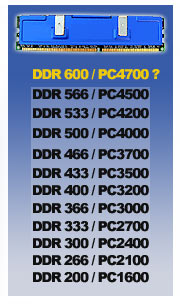 In highly competitive markets, once a major manufacturer releases a new and
innovative product, the rest will surely follow close behind. If one manufacturer doesn't follow suit,
their products are considered 'old tech'.
In highly competitive markets, once a major manufacturer releases a new and
innovative product, the rest will surely follow close behind. If one manufacturer doesn't follow suit,
their products are considered 'old tech'.
As always, everything always boils down to money and
that's why we have this dilemma; to run faster memory with slower access
times, or run slower memory with faster access times.
There are two trains of
thought on this, the first is that high speed DIMM's (like PC4000
DDR) can make up for running slower timings by the amount of bandwidth provide the
processor. Specifically, bandwidth is the amount of data that can
be moved from one given device to another.
Most DIMM's that run tight timings, such as certain PC3200 & PC3500
modules, have to run the memory at lower MHz than the FSB. However, when
overclocking to extreme speeds these DIMM's are bandwidth limiting the
processor. What I mean by this, is that when the processor requires a great
deal of bandwidth, the CPU will have to wait for another clock cycle before
being filled, as the memory is just not fast enough to keep up at the same pace.
Having a large pool of bandwidth is great when you're working with applications
that process a lot of raw data, such as Photoshop or databases for example.
The other point
of view is that CAS2-rated PC3200 & 3500 memory can
make up for the lack of bandwidth because the memory has a lower latency
that in effect moves data between the CPU and memory faster. Programs that
do not require a large amount of bandwidth tend to benefit more from quicker
data transfers between the memory and the rest of the computer; such as
games or 3D applications.
Are the benchmarks skewed?
I know that's what some of you will be saying when
you look at the benchmark suite, but let's be frank here. The enthusiast is
more likely to overclock their home PC than one running
the company web server, so it only makes sense that we focus our benchmarking effort on
the applications that are most likely to be used. These include games and simple word processing.
I can't see many enthusiasts overclocking their machines because they need to compile
a database faster...
For the testing we'll be running the test system at 250 MHz FSB. When using
the Corsair TwinX-4000 DIMM's the memory will be running in sync
with the FSB while using 3-4-4-8 memory timings. While testing the Corsair XMS3500
CAS2 DIMM's, please note that the memory is running at 200 MHz
(5:4 memory divider used) with timings of 2-2-2-5
.
Just for fun we also threw in some tests
with the Corsair XMS3500 CAS2 clocked at 333 MHz (3:2 memory enabled) while
using timings of 2-2-2-5.
| pcstats
test system specs: |
|
|
computer hardware: |
|
| processor: |
intel pentium 4 2.4c* |
| clock speed:
|
12 x 250 mhz = 3 ghz |
| motherboards: |
abit ic7 max3 |
| chipsets: |
i875p |
| videocard: |
ati radeon 9800 pro |
| memory: |
2x 512mb corsair twinx-4000
2x 512mb corsair xms3500
cas2 |
| hard drive:
|
20gb wd 7200 rpm hdd |
| cdrom: |
nec 52x cd-rom |
| floppy: |
panasonic 1.44mb floppy drive |
| heatsink: |
prometeia mach i |
| powersupply: |
pc power & cooling turbocool 510 |
| software
setup |
windowsxp build 2600
intel inf 5.20.1002
catalyst 3.7 |
| workstation
benchmarks |
business winstone 2002
content creation 2002
sisoft sandra
2004
pcmark2002
3dmark2001se
aquamark 3
quake iii
arena
ut2003 |
* - hyperthreading was enabled for all the tests.
